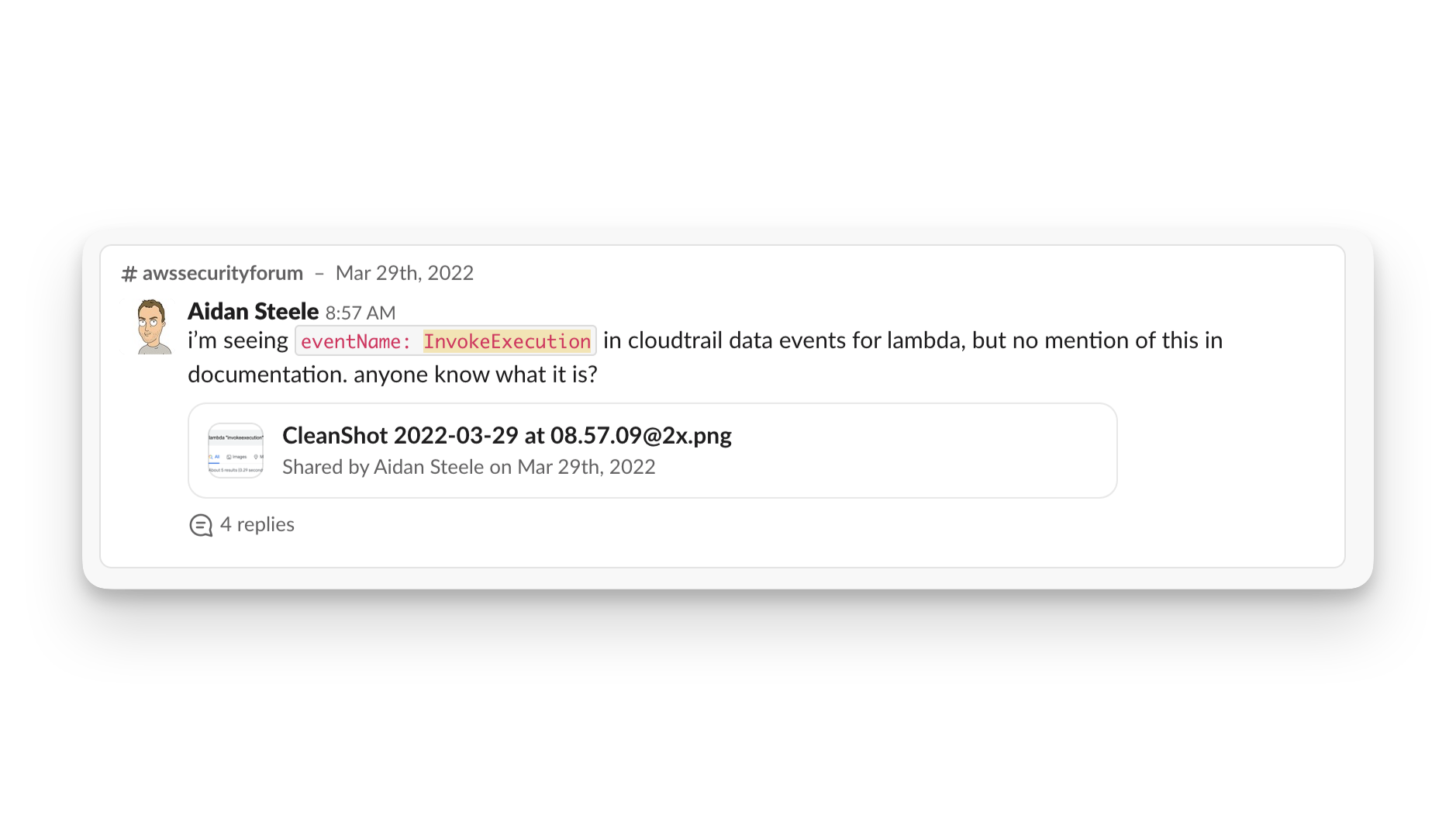Lambda CloudTrail data events
Today I was experimenting with CloudTrail data events for Lambda invocations, because I learned that as of 2021, these data events log the ENI ID used by a Lambda function invocation. For completeness, the event looks like this:
{
"eventVersion": "1.08",
"userIdentity": {
"invokedBy": "states.amazonaws.com",
"type": "AssumedRole",
"principalId": "AROAEXAMPLEZGVVXB2VC:wozynIhxRGfTvfRlXhHKONdyrIaAmRyN",
"arn": "arn:aws:sts::012345679012:assumed-role/My-RoleName-1746R4C1N6UFS/wozynIhxRGfTvfRlXhHKONdyrIaAmRyN",
"accountId": "012345679012",
"accessKeyId": "ASIAEXAMPLEQMIZPFY5",
"sessionContext": {
"sessionIssuer": {
"type": "Role",
"principalId": "AROAEXAMPLEZGVVXB2VC",
"arn": "arn:aws:iam::012345679012:role/My-RoleName-1746R4C1N6UFS",
"accountId": "012345679012",
"userName": "My-RoleName-1746R4C1N6UFS"
},
"attributes": {
"creationDate": "2023-03-21T05:32:03Z",
"mfaAuthenticated": "false"
}
}
},
"eventTime": "2023-03-21T05:32:03Z",
"eventSource": "lambda.amazonaws.com",
"eventName": "Invoke",
"awsRegion": "us-east-1",
"sourceIPAddress": "states.amazonaws.com",
"userAgent": "states.amazonaws.com",
"requestParameters": null,
"responseElements": null,
"additionalEventData": {
"customerEniId": "eni-02258670f86ec5c51",
"functionVersion": "arn:aws:lambda:us-east-1:012345679012:function:my-function-name:23"
},
"requestID": "006ee61e-4b61-4de5-b3b8-99b4d72ca7e7",
"eventID": "b1e55492-d8be-4b9a-b794-a8a0a28162f0",
"readOnly": false,
"resources": [
{
"accountId": "012345679012",
"type": "AWS::Lambda::Function",
"ARN": "arn:aws:lambda:us-east-1:012345679012:function:my-function-name"
}
],
"eventType": "AwsApiCall",
"managementEvent": false,
"recipientAccountId": "012345679012",
"eventCategory": "Data"
}
The ENI ID is at $.additionalEventData.customerEniId. It's also worth noting that
the executed function version is logged, but not the alias used for the lambda.Invoke()
API call.
Bonus¶
A pair of CloudTrail events caught my eye. There was a record with "eventName": "InvokeExecution".
I tried googling for "InvokeExecution" and got very few results. I figured fellow
CloudTrail nerds might have mentioned it, so I tried searching the Cloud Security
Forum slack and found this:

...turns out that I had asked the exact same question almost exactly a year ago and had forgotten all about it. So I thought I'd blog about it solely so Google indexes this and I can find it next time I forget about this and look it up again.
For the record: InvokeExecution events happen when a Lambda function is invoked
asynchronously, i.e. with an InvocationType: "Event" parameter. They appear in
pairs (or more, if the invocation fails and is retried): there is an Invoke
event and one or more InvokeExecution events. They can be correlated by the
CloudTrail record's requestID attribute - which also matches the request ID
in the function's CloudWatch Logs output. Interestingly, the Invoke record
does include the invoked alias (unlike the synchronous execution in the previous
example). The executed version and ENI ID are in the InvokeExecution record.
Here are examples:
Invoke¶
{
"eventVersion": "1.08",
"userIdentity": {
"type": "AWSService",
"invokedBy": "events.amazonaws.com"
},
"eventTime": "2023-03-21T05:32:03Z",
"eventSource": "lambda.amazonaws.com",
"eventName": "Invoke",
"awsRegion": "us-east-1",
"sourceIPAddress": "events.amazonaws.com",
"userAgent": "events.amazonaws.com",
"requestParameters": {
"functionName": "arn:aws:lambda:us-east-1:012345679012:function:my-function-name:live",
"invocationType": "Event",
"sourceArn": "arn:aws:events:us-east-1:012345679012:rule/my-rule-name-VMA1FQWKHEIL",
"sourceAccount": "012345679012"
},
"responseElements": null,
"additionalEventData": {
"functionVersion": "arn:aws:lambda:us-east-1:012345679012:function:my-function-name:14"
},
"requestID": "6baa1b22-d95f-4550-8528-2d0e0ea5b845",
"eventID": "32321ee4-ffd9-4fae-9207-a9bb12efc18c",
"readOnly": false,
"resources": [
{
"accountId": "012345679012",
"type": "AWS::Lambda::Function",
"ARN": "arn:aws:lambda:us-east-1:012345679012:function:my-function-name"
}
],
"eventType": "AwsApiCall",
"managementEvent": false,
"recipientAccountId": "012345679012",
"sharedEventID": "675fc334-334b-47a2-b2e0-f831cc51196c",
"eventCategory": "Data"
}
InvokeExecution¶
{
"eventVersion": "1.08",
"userIdentity": {
"type": "AWSService",
"invokedBy": "lambda.amazonaws.com"
},
"eventTime": "2023-03-21T05:32:04Z",
"eventSource": "lambda.amazonaws.com",
"eventName": "InvokeExecution",
"awsRegion": "us-east-1",
"sourceIPAddress": "lambda.amazonaws.com",
"userAgent": "lambda.amazonaws.com",
"requestParameters": null,
"responseElements": null,
"additionalEventData": {
"customerEniId": "eni-0fe91c93d7934f8a0",
"functionVersion": "arn:aws:lambda:us-east-1:012345679012:function:my-function-name:14"
},
"requestID": "6baa1b22-d95f-4550-8528-2d0e0ea5b845",
"eventID": "904d57aa-6ff8-43e0-9a78-a4ad67c32595",
"readOnly": false,
"resources": [
{
"accountId": "012345679012",
"type": "AWS::Lambda::Function",
"ARN": "arn:aws:lambda:us-east-1:012345679012:function:my-function-name"
}
],
"eventType": "AwsApiCall",
"managementEvent": false,
"recipientAccountId": "012345679012",
"sharedEventID": "f7d6a59b-1dbe-4114-94db-a8f10ed0a000",
"eventCategory": "Data"
}